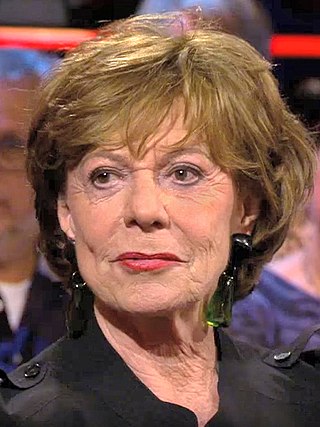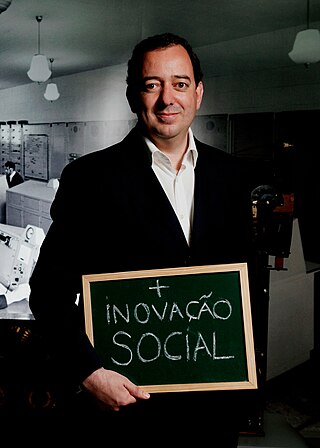Related Research Articles

The European Commission (EC), also called European Government, is part of the executive of the European Union (EU), together with the European Council. It operates as a cabinet government, with 27 members of the Commission headed by a President. It includes an administrative body of about 32,000 European civil servants. The Commission is divided into departments known as Directorates-General (DGs) that can be likened to departments or ministries each headed by a Director-General who is responsible to a Commissioner.

Neelie Kroes is a retired Dutch politician of the People's Party for Freedom and Democracy (VVD) and businessperson who served as European Commissioner from 22 November 2004 to 1 November 2014.

Viviane Adélaïde Reding is a Luxembourgish politician and a former Member of the European Parliament (MEP) from Luxembourg. She is a member of the Christian Social People's Party, part of the European People's Party. She previously served as European Commissioner for Education and Culture from 1999 to 2004, European Commissioner for Information Society and Media from 2004 to 2010 and European Commissioner for Justice, Fundamental Rights and Citizenship from 2010 to 2014.
The Barroso Commission was the European Commission in office from 22 November 2004 until 31 October 2014. Its president was José Manuel Barroso, who presided over 27 other commissioners. On 16 September 2009 Barroso was re-elected by the European Parliament for a further five years and his Commission was approved to take office on 9 February 2010.
DIGITALEUROPE is the European organisation that represents the digital technology industry whose members include 98 major technology companies and 41 national trade associations. It seeks to ensure industry participation in the development and implementation of EU policies" and has several working groups that focus on different aspects of policy—environment, trade, technical and regulatory and the digital economy. Based in Brussels, Belgium, DIGITALEUROPE represents over 10,000 companies with a combined annual revenue of over €3 trillion.

The Commissioner for Competition is the member of the European Commission responsible for competition. The current commissioner is Margrethe Vestager (ALDE).

The Directorate-General for Communications Networks, Content and Technology is a Directorate-General of the European Commission and is responsible for EU investment in research, innovation and development of critical digital technologies.

Sergey Dmitrievich Stanishev is a Bulgarian politician who is serving as a Member of the European Parliament (MEP). He previously served as President of the Party of European Socialists from November 2011 to October 2022, Prime Minister of Bulgaria from 2005 to 2009, Leader of the Bulgarian Socialist Party from 2001 to 2014 and Member of the National Assembly from 1997 to 2014.
The European Union Agency for Cybersecurity – self-designation ENISA from the abbreviation of its original name – is an agency of the European Union. It is fully operational since September 1, 2005. The Agency is located in Athens, Greece and has a second office in Heraklion, Greece.

Microsoft Corp. v. Commission is a case brought by the European Commission of the European Union (EU) against Microsoft for abuse of its dominant position in the market. It started as a complaint from Sun Microsystems over Microsoft's licensing practices in 1993, and eventually resulted in the EU ordering Microsoft to divulge certain information about its server products and release a version of Microsoft Windows without Windows Media Player. The European Commission especially focused on the interoperability issue.

The Executive Vice President of the European Commission for A Europe Fit for the Digital Age is an Executive Vice President of the European Commission responsible for media and information issues such as telecoms and IT. The current officeholder is Margrethe Vestager since December 2019.

The Data Retention Directive, later declared invalid by the European Court of Justice, was at first passed on 15 March 2006 and regulated data retention, where data has been generated or processed in connection with the provision of publicly available electronic communications services or of public communications networks. It amended the Directive on Privacy and Electronic Communications. According to the Data Retention Directive, EU member states had to store information on all citizens' telecommunications data for a minimum of six months and at most twenty-four months, to be delivered on demand to police authorities.

The Security & Defence Agenda (SDA) was a security and defence think-tank based in Brussels. Its activities included debates, international conferences and a range of publications. In October 2014, most of the activities of the SDA were incorporated into the Friends of Europe think-tank.

AGC Glass Europe is an international glass manufacturing group based in Louvain-la-Neuve, Belgium, and the European branch of the AGC Inc. Group.

Diogo Vasconcelos was a Portuguese politician, who focused his work on innovation and on the fundamental role of ICT and next generation broadband for fostering innovation and supporting new decentralized models to address some of the major global societal challenges of the 21st century. Diogo addressed such issues as climate change, urbanization, globalization, ageing population, sustainable prosperity, democracy and citizen’s participation, etc. During his career, he worked with different governments in Europe and the Middle East, with the European Commission, with the UN’s High Commissioner for the Alliance of Civilizations and the European Investment Bank, OECD, among others.
One Single Tariff is a European Citizens' Initiative against roaming in Europe. One Single Tariff's precise objective is to erase all barriers to phone calls within the EU by ending all roaming fees. It is the second European Citizens' Initiative to have been registered, on May 10, 2012, just one day after the initiative Fraternité 2020, which was presented by the European Commission on Europe Day. To be successful, it had to collect 1 million signatures before December 3, 2013, but it failed.
Electronic signature allows users to electronically perform the actions for which they previously had to give a signature on paper. Estonia's digital signature system is the foundation for some of its most popular e-services including registering a company online, e-banks, the e-voting system and electronic tax filing – essentially any services that require signatures to prove their validity.
On June 4, 2012, the Netherlands became the first country in Europe and the second in the world, after Chile, to enact a network neutrality law. The main net neutrality provision of this law requires that "Providers of public electronic communication networks used to provide Internet access services as well as providers of Internet access services will not hinder or slow down services or applications on the Internet".
The Startup Europe Summit (SES) is a pop-up conference that brings together entrepreneurs, investors, academics, policy makers and major corporates. It showcases new EU-funded initiatives designed to boost Europe's tech and web startups. The first SES was held in Berlin in 2015.
The Net Neutrality Regulation 2015 is a Regulation in EU law where article 3(3) lays down measures concerning open internet access.
References
- 1 2 "Digital Agenda for Europe - European Commission". Ec.europa.eu. 2013-01-25. Retrieved 2013-09-18.
- 1 2 "BBC News - European commissioner calls for 'digital champions'". Bbc.co.uk. 2011-11-02. Retrieved 2013-09-18.
- ↑ "Meet the European Digital Champions (17 December 2012)". EUagenda.eu. Retrieved 2015-02-20.
- ↑ D'Arcy, Matthew. "EU promotes 'digital champions' to end exclusion". Archived from the original on June 19, 2012. Retrieved July 17, 2013.
- ↑ "Barroso asks Member States to appoint a national Digital Champion « Telecentre Europe". Telecentre-europe.org. 2012-02-22. Archived from the original on 2013-09-21. Retrieved 2013-09-18.
- ↑ "3rd Digital Champions Meeting - TE @tc_europe". Telecentreeurope.ning.com. Retrieved 2013-09-18.
- ↑ "Agoria>Opinions : Saskia Van Uffelen est notre "Digital Champion"". Agoria.be. Archived from the original on 2013-04-13. Retrieved 2013-09-18.
- ↑ "Saskia Van Uffelen, 'Digital Champion' belge - actualité - Datanews.be - Datanews.be". Datanews.levif.be. 20 November 2012. Retrieved 2013-09-18.
- ↑ "Ex Bulgarian Minister Becomes EU 'Digital Champ' - Novinite.com - Sofia News Agency". Novinite.com. 2012-06-25. Retrieved 2013-09-18.
- ↑ "Stelios Himonas". Cyprus Mail. 2013-06-22. Archived from the original on 2014-10-16. Retrieved 2013-09-18.
- ↑ "Internet in the Czech Republic - Aspen". Aspeninstitute.cz. 2013-02-12. Archived from the original on 2014-10-15. Retrieved 2013-09-18.
- ↑ Ann O'Dea (2013-06-18). "Finland's Digital Champion Linda Liukas in conversation with Silicon Republic at the IIEA (video) - Digital 21 - Digital 21 | siliconrepublic.com - Ireland's Technology News Service". siliconrepublic.com. Retrieved 2013-09-18.
{{cite web}}: CS1 maint: multiple names: authors list (link) - ↑ "Gilles Babinet nommé "digital champion" | Ministère du redressement productif". Redressement-productif.gouv.fr. 2012-06-26. Retrieved 2013-09-18.
- ↑ "DPAS Summer workshop".
- ↑ "Prof. Romain Martin appointed Digital Champion". N.uni.lu. Retrieved 2013-09-18.
- ↑ "Government appoints Godfrey Vella as Malta's new Digital Champion | di-ve - Malta's news, lifestyle & classified". di-ve. Retrieved 2013-09-18.
- ↑ "Digivaardig Digiveilig". Digivaardigdigiveilig.nl. Retrieved 2013-09-18.
- ↑ "Biblionet Director Nominated for EU Digital Champion of Romania | IREX - Civil Society, Education and Media Development". IREX. 2012-02-24. Archived from the original on 2013-09-03. Retrieved 2013-09-18.
- ↑ "Digital champion - Vice-President of the European Commission Neelie Kroes appreciates efforts of the Slovak Digital Champion". Digitalchampion.sk. Archived from the original on 2013-09-18. Retrieved 2013-09-18.
- ↑ "Regeringen utser Jan Gulliksen till Sveriges Digital champion" (in Swedish). Regeringen.se. 2012-09-06. Archived from the original on 2014-10-13. Retrieved 2013-09-18.